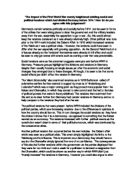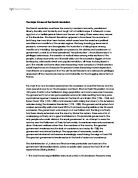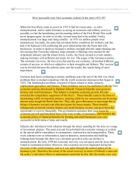How successful were the attempts by Alexander II to reform Russia?
How successful were the attempts by Alexander II to reform Russia? After the brutal and extended Napoleonic wars, Russia was perceived as a powerful state that managed to repel the armies of the great Napoleon I. Despite this military success, Russia remained domestically backwards economically, politically and socially. The Crimean war had revealed true weaknesses in the Russia industrial sector. Reforms urgently needed to be instigated if Russia was to become part of the modern European nations. Amongst all Russian Tsars, it would be fair to describe Alexander II as a pioneer. His father Nicholas I recognised the importance of reforming Russia but feared the consequences of doing so, as Tsars Peter III and Paul I had both been assassinated by unhappy nobles. However, Alexander II most notorious restructuring was to be the emancipation of the serfs. The noble's ownership of serfs was at the heart of all Russia's economic problems. Alexander II ordered the serfs to be freed in 1861. This was to mark the fist real effort from any Russian Tsar to reform an outdated system. By freeing the serfs Alexander II forced the Aristocracy to sell of their land and to take up jobs, thus making an effort to end unfair in heritage and promoting, to a certain extent a meritocracy. Serfs were also to suffer less cruel treatment at the hands of greedy landlords. They were given the right to
The Weakness of the Directory was the main reasons for Napoleons rise to Power. How far do you agree?
The Weakness of the Directory was the main reasons for Napoleon's rise to Power. How far do you agree? On 10th November 1799 the Coup of Brumaire brought about a leader who would bring France's power to the forefront of Europe, a nation feared by all others. The coup was the final of a series of coups between 1797 and 1799. This shows that the Directory was extremely weak which caused Napoleon to rise to power, however there were other reasons as well, such as Napoleon's political connections, his success in wars and his own personal strengths, and the opportunities he creates for himself. The revolution in France was by no means a quick process, taking over ten years before stability was finally regained and Napoleon came to power. During the ten years there were many different types of government all with different ideas, however not one of the governments really affected the peasants, thus the people of France became fed up. Fed up of paying taxes to sort out the massive financial chaos, fed up of paying for pointless wars and so people just didn't care enough to stop Napoleon rising to power, despite warnings about him from Benjamin Constant, who believed he was to self-centred, which through policies in the Napoleonic Code actually turn out to be true. The revolution also created a whole in the army due to many of the military generals who were loyal to the king,
Why Did OConnell Achieve More For The Nationalist Cause In Ireland Than Young Ireland Or The Fenians?
Why Did O'Connell Achieve More For The Nationalist Cause In Ireland Than Young Ireland Or The Fenians? Although O'Connell was not entirely successful himself in forwarding the nationalist cause in Ireland and achieving all that he aspired to it can be said that he at least did achieve more for the nationalist cause in Ireland than both Young Ireland and the Fenians. Part of the reason for his success over both the Fenians and Young Ireland lies within the aims of the three groups. For instance, through the Catholic Association O'Connell attempted to embrace wider aims than just achieving Catholic emancipation. These wider aims include electoral reform, reform of the Church of Ireland, tenant's rights and economical development. These aims were an important factor in trying to advance the whole interest of the Irish, Catholic community, and so as a result these aims attracted a wider range of supporters, which in turn is another factor as to why O'Connell and the Catholic Association achieved more than the Fenians or Young Ireland. In contrast, the aims of Young Ireland and the Fenians were relatively narrow in terms of embracing problems of the whole Irish, Catholic community. For example they both wanted a repeal of the Act of Union as well as an overthrow of British power. In addition Young Ireland also wanted to overthrow the Landlord system in Ireland; this was the only
Compare and access the main reasons for the failure of the Italian revolutions due to poor leadership in the period of 1815 1831
Compare and access the main reasons for the failure of the revolutions due to poor leadership in the period of 1815 - 1831 The revolutions between 1815 and 1831 had a variety of factors that caused them to fail instead of succeed in this period of time. These revolts that took place in various states were mainly organised and founded by the middle class, they believed that revolts would ensure a change in government and the way in which these states were ruled. These secret societies formed in Italy to enhance the Italian way of life, they even schemed abroad in places such as London and Paris. However the main reasons for the failure of these results is due to the large proportion of people such as peasants and workers not supporting them well enough to have a large affect. The revolution could not be a social one due to the fact the middle class was such narrow part of the population and did not involve others. The lack of communication was a key issue due to the revolutions were all localised, the French revolt of 1830 gave the Italian societies a sense of hope that the French would support their needs in Italy. They did not manage to obtain any foreign support to counter the Austrian influence in Italy. No outside power was prepared to help the revolutionaries the Austrian power was simply too overruling. The first revolution begun in Naples in 1818, the middle classes
How can we explain why the holocaust happened?
Why would the Jews accept a leader like Hitler, who seemed so cruel? It was partly because of the way they suffered after the First World War; Germany was crippled with debt and had reparations to pay to the countries it had attacked. The Germans were miserable after 1918 and thought longingly about the time when they had a strong leader-Bismarck. Hitler was that up and coming leader. He grew up in Austria with his mother. From an early age Hitler hated the Jews, he grew up in poverty while his next door neighbors, the Jews, were rich and successful. He hated them and wanted everyone else to agree with him. They made him feel inferior and he disliked that, so as he grew up, he had a strong desire to rid the earth of them. Hitler made films of the Jews as rats, swarming and plaguing everything and everyone, he wanted people to hate the Jews like him. He got together lots of amazing propaganda that like brain washed the public, so that everyone would side with him. Hitler's excuse to everyone was that he was a Christian and that it was the Jews fault that Jesus died, so he hated them. In his biography Mein-Kemp he described the new world order he would create after he annihilated the Jews. It was strange to think the Germans would accept a person like Hitler, but they were hungry for a leader. The German people were ready and willing to accept Hitler's mighty machine, which
Hindenburg and the Causes of Mullers government collapse.
This time period was a crucial one for Germany because it is the time when democracy ended and authorial rule became about once again. President Hindenburg played a major roll in this change in Germany mainly due to the fact that he was the one with all the power, in the position of president he could appoint and dismiss chancellors at will with also the power to decide legislation. However he wasn't the only one at fault for the breakdown of politics, with several others who had a major part and even some contributing factors all the way back from the end of the First World War. Hindenburg had some weaknesses to him such as that he was growing old and senile which affected his judgement. Causes of Muller's government collapse There is one main reason which comes from several factors of why Muller's government collapsed. This is the problem of money which generates all the way back from the First World War, which is of money. These problems started with the reparations Germany had to pay to the allies which was enforced in the Treaty of Versailles. The next problem was the impact of the hyperinflation which further damaged the economy. The last impact was the Wall street crash of 1929 which brought on the great depression via the fact that the war loans had stopped being paid to Germany. This put Muller under great pressure and forced him to resign. This was the end of the
Mussolini(TM)s rise to power up to 1922 owes more to the failures of others than to his own strengths. To what extent is this true?
Mussolini's rise to power up to 1922 owes more to the failures of others than to his own strengths. To what extent is this true? In the 1922 general election, Mussolini won no more than 2% of the parliamentary seats yet, by the end of the year the leader of the Fascist Party had become dictator of Italy. He had nowhere near enough electoral backing to establish a government and, had his march on Rome gone ahead his squads could easily have been crushed. He was handed the position by a few governing élites; there was no election, little resistance and no seizure of power. The issue of who was to blame for this unelected success in Italy's so-called democracy is highly controversial and undecided amongst historians. While most historians accept that there were numerous contributing factors, there is disagreement as to the significance of each factor. In his book 'Modern Italy', Martin Clark1 places the emphasis on the failure of the King and the elite. However E. Tannenbaum primarily blames the governmental failure to rebuild a strong Italy after the unification2. In my opinion both are important, as are other factors such as Mussolini's own skills, the political system and the politician's failure to work together in strong coalitions. In this essay I will discuss the argument that the failures of others played a greater role in Mussolini's rise to power than his own
Why and with what consequences did Italy go to war with Abyssinia in 1955?
Why and with what consequences did Italy go to war with Abyssinia in 1955? In 1935 Mussolini Italy invaded Abyssinia with consequences that affect both the international and domestic scene. But why would Mussolini attack Abyssinia and what consequences did this cause? The reason why Mussolini invaded Abyssinia can be explained with a mixture of long term and short term international and domestic factors. In the long term internationally Mussolini had a long held nationalist dream to re-create the glories of Ancient Rome consisted of central Europe and was a great power. Mussolini wanted to consolidate East African territories. Italy already controlled the Eritrea and the Italian Somaliland in Africa and between these two territories was Abyssinia. If Italy could control Abyssinia they can be a major power in Africa. Mussolini wanted to avenge the humiliating defeat at Adowa in 1896. He wanted to prove that Italy was a great power in the world and by invading Abyssinia he could prove to Britain and France the Italy is a strong country and would increase Italian prestige. The Mutilated victory played a part in why Mussolini invaded Abyssinia because Italy felt hard done by because they felt they didn't get land which they felt was rightfully theirs so Mussolini was avenging the Versailles treaties. In the medium term Mussolini wanted to develop the cult of the Duce, being
Mussolini comes to power, October 1922.
Mussolini comes to power, October 1922 Since September 1922, rumours of an imminent fascist march on Rome had been circulating. This followed a general surge of support for the fascist movement after the taking over of local government and dispersing of socialist councils by the fascists during the summer. Liberal politicians had been giving serious consideration to the incorporation of Mussolini into a new government, but Mussolini had rejected this, stating that he would assume the position of Prime Minister or not be a part of government at all. On the 16th of October, Mussolini and other leading fascists agreed to stage an insurrection. On the 24th, a fascist congress decided to organise a march on Rome with the intention of seizing power. Fascist squads were to take over key buildings and areas in north and central Italy, and others were to assemble on the 27th outside of Rome, to march into the city the following day. Mussolini made it abundantly clear that the fascists would either be offered control of the country or take it by force. Mussolini was initially doubtful with regards to the march, and hoped that he might be appointed through peaceful, legal means. These fears were countered however by the need to retain the support of the more aggressive fascist element within the movement and the idea that the threat of a fascist march might intimidate the king
Why Did the British Mass Media support the appeasement of Hitler in the years 1933-1939?
History of Journalism - Essay 2 Why Did the British Mass Media support the appeasement of Hitler in the years 1933-1939? Appeasement was the conciliatory policy adopted by Britain and France towards the aggressive foreign policy of Nazi Germany in the years preceding the Second World War. In Britain it is normally associated with the Prime Minister Neville Chamberlain but was also followed by Stanley Baldwin. It has been argued by historians such as Richard Cockett that the press in Britain was manipulated by Whitehall - especially during Chamberlain's years as Prime Minister - to publish only pro-appeasement articles and news and therefore "no alternative to the policy of appeasement was ever consistently articulated in the press."1 It is indeed partly true that Chamberlain was a master of press manipulation and the BBC broadcasts were closely monitored by the Foreign Office. However it would be incorrect to assume that all of the press was pro-appeasement and there were dissenting voices. One must also examine in part the role that Hitler played in attempting to control the news that foreign correspondents in Germany sent back to their publications. In order to examine why some publications such as The Times followed a policy of appeasement one needs to look why at why politicians, like Chamberlain, were convinced that it was necessary. The actual policy of appeasement


























